Quite ironically after that last post on health and wellness, I find myself with time to finally sit down and write this next post because I am once again ill, with a bacterial infection that makes it dangerous to stray too far from a toilet. That also serves as my acceptable excuse for not spending the day at yet another baptism. The medicine is kicking in, and I can’t nap any longer or I’m asking to spend the night wide awake, so I’ll tell you all a little about our site assignment.
During Field Based Training all the volunteers were interviewed by our program director, Basilio. He asked us about our preferences, our goals for Peace Corp service, and our interest in side-projects. Fletch and I had separate interviews, but we’d spent a lot of time talking about it. We wanted rural, colder rather than hotter climate, and I wanted to opportunity to study a Mayan languages (there are 22 spoken here in Guatemala), while Fletch preferred to stick more to Spanish.
We were completely in agreeance about not living in any area near the jungle or the coast because the heat kills us—I’d probably dream of shaving my head the entire time, but be unallowed by PC regulations because it is culturally inappropriate for women to sport such a style here. We thought the language request would actually be a pretty easy thing to match since, traditionally speaking, if there is a semi-bilingual community it is always the case that the men speak Spanish fluently as their second language, and the women hardly speak any Spanish. This is due to the difference in schooling between girls and boys as well as opportunities to work outside of the home or community. In Guatemala, there are so many languages spoken that sometimes, going to the next town over means the language and traditional dress changes drastically. And finally, our secondary project interests are pretty compatible: Jaime, as everyone calls him here, wants to work on trash disposal with a compost by-product, and organic gardening (super easy since chemical fertilizers are way too expensive for them at the moment) with the families, teaching them to cultivate more than rice and beans; I am interested in working with women on preventive health through cooking classes, teaching them how to cook balanced meals in the hopes that by eating better they will not be so predisposed to becoming ill. Perhaps in this way I can also assure that I will get to eat more than just rice, beans, and eggs for the next two years. I’ve met a current volunteer who has had major success on this side project. Thank you, Cornucopia, for all the food lessons over the last few years! The vegetarian recipes will serve me well since just about no one eats meat on a regular basis—cost prohibitive.
A little aside: We are not in Africa, and in that we’re pretty lucky. What I mean is we aren’t combating serious droughts or food shortages. This is the land of volcanos—34 in an area the size of Louisiana—which means amazingly fertile soil. Thus Guatemala produces the 3rd highest quality coffee in the world. But it also produces phenomenal mangos, papayas, pineapples, bananas, apples, and peaches, carrots, green beans, potatos, avocados and different types of squash. That makes it particularly painful to see the malnourishment here. People, I’m talking poor, uneducated, subsistence farmers, are fighting to survive and don’t deviate from the traditional rice and beans. Local markets are overflowing with inexpensive, nutritional foods, but people’s diet far from reflect this abundance. This makes my job one step closer to easier, as I’m not asking people to base their diets on high priced, imported, and less nutritional food. I just need to be really clever in convincing them of the benefits of what they’ve already got on hand. In fact, one of the biggest challenges will probably be convincing them that coca-cola is really not a smart buy, monetary or health wise. They love it here. They love it so much that it’s called agua, that’s right, water. I was so confused the first time I told someone that I would like water and they offered me a choice between two kinds of pop. Real water is called agua pura. Be specific. I mentioned the malnourishment, but I think our program director put it best when he said, “It’s crazy when you look around this country and realize we have a double epidemic on our hands, of malnourishment and obesity.” Honestly, I think it will be easier to reach rural families here regarding their eating habits, than families in the US. Here they’ve been eating pre-packaged, fortified, and preserved foods for anywhere between 15 and 20 years, and they’re still producing a decent amount of what they eat. We Americans have been been going to the supermarket for nearly everything in rapidly growing numbers since, what, the 1950’s? It’s all just very interesting to me, but enough of that. Continuing on with the original program…
The time between the interviews and finding out what our actual placement would be was about 3 weeks. These weeks were wrought with wild guessing and gossip about who heard what from our director, and who was going where. I kind of laughed most of it off. Though when people asked me what I thought my destination was I told them, I’m pretty sure we’re going to Huehuetenango. “Why?! What did Basilio tell you? How do you know?” No one had told me a thing, I just felt it was going to happen that way. It became such the joke that while everyone was stressing out about the wait to find out, my friend once looked at me and said, “Of course, it’s not big deal to Emily. She already knows where she’s going.” And I had to laugh, and tell them I could be wrong, but that’s just the way I felt, and Fletch agreed.
June 25 was the Day of Destiny. Our director and assistant director showed up at our towns with our assignment folders wrapped up like Christmas presents and a giant map to make us guess where we were going before we got to open them. Katy and I had our husbands come to our town since he was coming here first and we wanted to be with the spouses. In the end I stuck the nail a 40 minute drive from our actual site in, I-told-you-so-everyone, Huehuetenango. I felt it was, fate as the town is named after the patron saint of Barcelona, Santa Eulalia. She was a thirteen year old martyr burned at the steak by the romans, and the Cathedral of Barcelona supposedly sits on the site where she was killed. Cheery, eh? Anyway, it’s 100% indigenous, and they speak a language called Q’anjob’al (sort of said like can-hoe-ball, or as our friend, Joe, called it, Crystal Ball). There is not much Spanish to be had. But we’re up in some beautiful, chilly mountains working in mostly rural areas.
Since this meeting took place first thing that morning, we had all planned to meet up with the other volunteers in Antigua to share our assignments and postulate and work out all the details. Funny thing, the night before, the police had decided to crack down on camioneta drivers without a valid state license—that meant there were about two buses running all day, as opposed to about 2 buses every ten minutes. Most drivers here just don’t bother with paying for official certification. But you can’t stop a determined Peace Corp volunteer, much less 5 of them. We ended up walking most of the way into Antigua because we realized, we didn’t really have anything better to do—and I hear that is often reason enough for the determination we will find ourselves possessing these next two years. : )
Our site was just a few days later, so everyone spent the intervening time agonizing over how and what to pack. We were all going to be driven to our sites by our counterparts, the health staff that we will be working with for the next two years. This meant we had a good opportunity to take just about everything we owned without having to drag it on and off 4 camionetas for the 10 hour ride where it would be secured, who knows how well, to the roof of these out of date school buses, being driven by crazy, mostly unlicensed drivers, up winding mountain roads. We tried to take full advantage of the opportunity.
All the volunteers and counterparts met for a day and half conference about 4 hours north of here to meet and make sure everyone was absolutely clear about who we were, why we are here, and what all we are and are not allowed to do in the next two years. It was here that we met our counterparts Dr. Ervin and Aurelio the Health Tecnician. The culture here is pretty amusing to me in that everyone loves making big speaches to crowds, all the time, but on an individual basis it’s really hard to get them to talk. When they do talk, they are never very explicit so you’re always guessing about what they’re really trying to tell you. This is hard for me, because in English and Spanish I’m really awful at picking up on subtle hints. It’s hard for Fletch because he’s working really hard every minute of the day just to understand the words coming out of people’s mouths. Thus, as we piled 6 adults and a ridiculous amount of luggage into a little jeep for the 6 hour journey north, we were still pretty uncertain about these guys.
They were not any more talkative in the car, but the scenery was beautiful. A few hours into the ride we stopped for a “technical break” which meant all the guys went to pee in a corn field. I was sad, because there isn’t a corn stalk in the world wide enough to hide my behind, so I didn’t get to go. : ( But I did get out to stretch my legs and look out across the valley below us. Our driver came back and said, “You see those mountains over there, the tallest one? That’s the one we’re going up.” The views here are pretty much amazing. We dipped down into the valley and the city of Huehuetenango to reach the tallest mountain, the one he’d pointed out, and started climbing. I am not kidding, at one point it felt like we were climbing to the top of the world, we just kept going up and up and up. We ‘re living up and over the tallest mountain in the Cuchutumanes Mountain range.
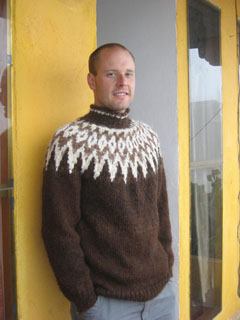 We arrived in beautiful Santa Eulalia after the sky had already fallen on the town, as it apparently does every day after noon or so. It was all cold mist and rain, and there was a city wide power outage. Beautiful. Aurelio helped us locate the cheapest hotel in town, the only one our meager budget could afford, and left us to rest. This hotel can quite aptly be described as sketch, though it supposedly offered hot water 24 hours a day. That is, except when the power is out because it’s heated electrically. It’s best feature was, by far, the wall of windows the looked out on the balcony outside of our room, which meant we weren’t sitting in total darkness in a cement box every time the power went out—which it did every day we were there. And even in it’s pretty grungy condition it was still a huge relief to have a quiet space where we could speak only to each, other only in English, and hang out without having to worry about being home before dark.
We arrived in beautiful Santa Eulalia after the sky had already fallen on the town, as it apparently does every day after noon or so. It was all cold mist and rain, and there was a city wide power outage. Beautiful. Aurelio helped us locate the cheapest hotel in town, the only one our meager budget could afford, and left us to rest. This hotel can quite aptly be described as sketch, though it supposedly offered hot water 24 hours a day. That is, except when the power is out because it’s heated electrically. It’s best feature was, by far, the wall of windows the looked out on the balcony outside of our room, which meant we weren’t sitting in total darkness in a cement box every time the power went out—which it did every day we were there. And even in it’s pretty grungy condition it was still a huge relief to have a quiet space where we could speak only to each, other only in English, and hang out without having to worry about being home before dark.
Since the power was out all over town, we went to find dinner in time to get back before dark. Aurelio had told us which were our most sanitary options for dining—there were two, and we could only find one of them. We sat in near darkness eating liquified black beans, cardboard tasting tortillas (I diferentiate because normally they’re pretty tasty), and hot tea by candle light, scarcely attended by a waitress who looked at us like we were aliens every time she did come around. Fletch could not help but point out how romantic the whole situation was as he welcomed me to our new home. : ) Thing is, sometimes, to laugh is all we can do.
WIth our down time I finished Fletch’s llama wool sweater while we were there. Yay! It was so cold he ended up wearing it immediately after it was finished. It turns out to be a good thing I brought it. Gracias a dios we didn’t get sent to the jungle. Also, I’m quite excited that there are lots of sheep herders in this area because I’ll have access to wool, so the wool carders and drop spindle I took a gamble to bring might also come in very handy. 🙂 The thing is, time moves differently here. So even if we are working like mad with the community, it is the life of a PCV to have lots of down time.
The next day we were supposed to meet our counterparts at the health center at 8. We showed up at 8, they came at 8:30. Aurelio promptly walked us around town to show the place and introduce us to some community members. The mayor was out, so we met his deputy mayor. We killed about 2 hours this way. Then we walked back to the health center, which was by now packed with indigenous women and children and a few stray men. Aurelio said we could start by introducing ourselves to the people waiting. So I started an impromptu little speech for everyone. I told them who we were and what we were doing and then made sure to let them know our first job is to learn Q’anjob’al.
They all smiled very pleasantly at us the whole time. When I asked if anyone wanted to teach us how to say, “Good morning,” they all just looked at us more and continued to smile pleasantly. One guy finally spoke up a little, and we sat down next to him. Fletch pulled out his sketch book and started to draw the guy as he talked to us, his trick of pulling people in to talk to him. It works everywhere, any time we travel, except apparently here. When he finished his sketch, we sat pleasantly like statues to be looked at in the waiting room for a good 45 minutes before deciding it was time to get lost. We set up our next meeting time for 2pm. It was such a relief to get out of that waiting room. We hoped whatever he had planned for us in the afternoon, some visit to an aldea, or outlying community, would be more successful than health center wating room venture.
We showed up to meet Aurelio at 2, he showed up with the Doctor at 2:30. We have got to get used to this. We got in a micro-bus (a 15 passenger van) and headed out to the little aldea—whose name I guess I’m not supposed to mention for security reasons, but I think Fletch already told. What happened there was a pretty unbelievable reception, one surprise after another since we arrived completely clueless.
As soon as we stepped out of the van, into total fog mind you, there was a group of community leaders there to great us. They ushered us up the road and into their health center to give us a tour. We’d heard that it was quite nice and new, and it had at some point been suggested as our new residence. As we walked into the Puesto a thundering succession of bombas and blackjack firecrackers went off, which scared the crap out of both us. The nurse, who was between us, looked at us and said, “Those are for you,” with a smile on her face. Heh, we half-smiled back. The waiting room we’d walked into was pretty sparce, but there was a table set in the middle with a nice cloth and fresh cut roses. The nurse pointed them out and said, “Those are for you,” with a smile on her face. The 7 or so community leaders and nurse plus Aurelio and the Dr. led us through the Puesto showing us the new examing room and office space, the full kitchen, bathroom, and apartment at the back. Everyone was pretty excited. To their credit, this was above and beyond any other Puesto we’ve seen so far. It was tasteful, actually, with interesting dimensions, a natural skylight, and immaculately clean, whereas the others have all been pretty grungy, leaky, badly lit, concrete boxes. So all of these guys leading us around with giant smiles on their faces had reason to be pleased since they were part of the task force, and probably the labor force as well, that built the Puesto last year.
After the tour they sat us down at the table to discuss the practicalities of our living arrangement. They wanted us to live right there in the Puesto, as there was an apartment space at the back. We were and are a little hesitant about this arrangement for a few reassons: There will be people in our living space from 8-2, five days a week; if someone gets sick in the middle of the night they might very well come knocking on our door asking for medecine we are not authorized to give; and we would be smack in the middle of the town so there would be no privacy for us. There is a new PC regulation that states a volunteer should spend the first 3 months of service living with a family in the community if at all possible, so we told them that. They him-hawed around a bit, and eventually came out with a “Fijese que…no one in this community has a shower, we all use a chuj.” Ahh, they were just trying to accomodate us with what they thought would be closest to our standard of living in the US. The puesto has a shower. A chuj is a little earthen hut they use to make a type of sauna. They take a bucket of warm water in with them and use it in addition to the steam to clean off. The heat comes from a wood-fire so most people bathe about two to three times a week. They light it up and every member of the family gets to take a turn. They just didn’t want the Americans to have to bathe like they do. So we politely explained to them that our first job in our new home is to learn their language and the way they live by participating in the community. We are for sure never going to learn Q’anjob’al living on our own and speaking English all the time so I was pretty insistent about the idea of living in a home with one of the families of the town.
They were pleasantly surprised,but taken aback. You could tell we just changed their plans entirely. So then they asked us what we needed in a home and we told them, a room with a bed for two, a table with two chairs, and some shelving for our clothes. They decided after we left they would have another meeting to find that for us, but for now we had to be presented to the community. Someone grabbed a piece of paper and wrote a quick agenda, then every one stood up and they led us out of the Puesto and down the hill to the school.
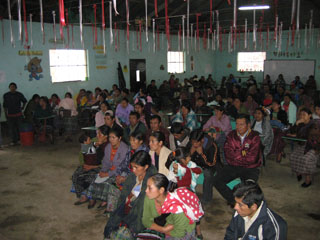 We walked in to the school room/town meeting hall, and there sat the entire town. Whoa. We took our seats on the stage, Fletch on the end, myself, then the nurse, and the meeting commenced. All of the town leaders and the health Technician had a chance to speak, telling the community who we are (and are not, i.e. not doctors or nurses), and what we are going to do (or not i.e. give out food rations or presents). Quite amazingly, they said everything to a T. For the duration of the entire presentation, which was in Q’anjob’al, the nurse translated to me in Spanish, and I would turn and translate to Fletch in spanglish. The most moving speech came from a man with no official title, as the nurse Lucia told me, he is just a well-respected member of the community.
We walked in to the school room/town meeting hall, and there sat the entire town. Whoa. We took our seats on the stage, Fletch on the end, myself, then the nurse, and the meeting commenced. All of the town leaders and the health Technician had a chance to speak, telling the community who we are (and are not, i.e. not doctors or nurses), and what we are going to do (or not i.e. give out food rations or presents). Quite amazingly, they said everything to a T. For the duration of the entire presentation, which was in Q’anjob’al, the nurse translated to me in Spanish, and I would turn and translate to Fletch in spanglish. The most moving speech came from a man with no official title, as the nurse Lucia told me, he is just a well-respected member of the community.
He stood up and reinterated the fact that we aren’t doctors or nurses, but here to give educational talks on how to prevent disease and illness. He told them that during the first year, we would do nothing other than these talks. He explained to them that in other Guatemalan communities North American aid organizations have come in and built water containment systems, latrines, and improved stoves, but they found when they returned to check on the town’s progress later that the latrines had become chicken coups or 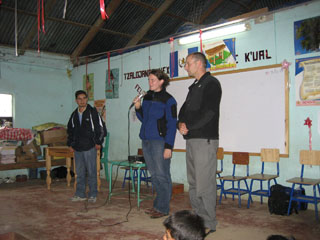 sheds for farm tools, and the stoves were never used because people didn’t understand the link to the technology and their health. For that reason, we are going to talk to them about changing some simple habits, and then about simple technologies that could help them if they were interested in collaborating with us to build them during the second year of our residence.
sheds for farm tools, and the stoves were never used because people didn’t understand the link to the technology and their health. For that reason, we are going to talk to them about changing some simple habits, and then about simple technologies that could help them if they were interested in collaborating with us to build them during the second year of our residence.
Then he reminded them that as a community they had suffered greatly from the civil war (these are the people that ran across the Guatemala/Mexico border in the middle of the night to save their lives), but since the Peace Accords (that was in 1996) the government made a commitment not to leave them behind as they had in the past. He said that our presence in the community was part of this promise, as well as a recognition of the hard work and progress the community had managed on their own. He urged them to take full advantage of our presence in the community.
I was listening to the translations, and then translating it again, to Fletch, and thought, “oh my god.” It was only after I sat down to write verbatim, what I remembered that the whole thing just made me cry.
The town was told that our safety and security were, in part, their responsibility, and that they should not spread rumors about us, nor let rumors started by neighboring villages be spread. They had the responsibility to let everyone know we were not baby stealers. In fact, they said, we had nothing to do with the child who disappeared two months ago. Again, oh my god. The child that disappeared two months ago! Aurelio, the health Technician, told them they should let us in to the community, to teach and learn from them. He asked them not to close their doors on us like they close their doors on the health workers who come for the vaccination campaignes. Hah! And he said if they take full advantage of this exchange, at the end of the two years they will be sad to see us leave, and we will be sad to leave them. They reminded the town we had left our family and friends behind to come here, and they should treat us in kind so we are not sad and lonely for the next two years.
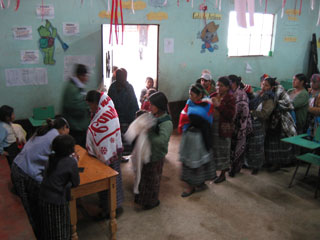
The presentation was so to the word perfect, I kept wondering, “Ok, so when does this get hard?” I mean, we’ve been briefed o
ver and over about people being very unclear about what we are doing here and why. These people were not even a little unclear or confused. To top off the whole presentation they gave the community time to talk amongst themselves, ask any questions they had about us, and then vote on whether they wanted us to live there with them or not. They voted yes, they wanted us to stay.
We had an opport
unity to speak. So we told them that our first job was to learn their language, and we were very excited to be so welcome in their community, and we looked forward to the work we have ahead of us.
The community leaders had already written up and accord for the entire community to sign, to protect our safety, security and happiness and work with us for the next two years. Unbelievable. We saw later that over half of the signatures were just fin
gerprints. And while the the towns people were lined up and signing the accord, we were ushured back to the Puesto for a dinner prepared by local women. They had killed a chicken for us. We ate their chicken soup and tortil
las and got to the know the leaders and nurse a bit better. At the close of the meal they thanked us again, gave me the roses from the table and sent us on our way back to our hotel.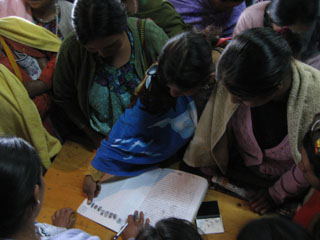
I couldn’t have imagined a better reception. They say the PC volunteers who have it hardest are the ones who have a community that is completely apathetic to their presence and work. That, so far, does not appear to be a problem in our community. This was not our original site assignment, but the health Technician saw that this town could use us, and he decided it would be best for us to go there. So when we returned to Santa Lucia at the beginning of the following week, we met with our country director to tell him the whole story. He had goose-bumps the entire time, but said because it wasn’t our original site they didn’t have the proper security information and they hadn’t met the town leader so he would make a trip there before we swore-in. He and the security director went together.
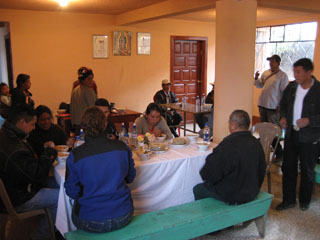 They said it looks like we have been set up for the “authentic” Peace Corp experience. We’ve been told once we arrive that our choices for rooms are between two: one that is adobe with a dirt floor, and the other is a wood slat room with a wood slat floor. They both have their advantages and disadvantages, but the former might be the best choice, as we can show by example what simple technologies we can employ to improve the sanitation of the room. We’ll see when we get there. This is definitely an adventure…
They said it looks like we have been set up for the “authentic” Peace Corp experience. We’ve been told once we arrive that our choices for rooms are between two: one that is adobe with a dirt floor, and the other is a wood slat room with a wood slat floor. They both have their advantages and disadvantages, but the former might be the best choice, as we can show by example what simple technologies we can employ to improve the sanitation of the room. We’ll see when we get there. This is definitely an adventure…
As always, we miss you guys. Take care, and let us know what you’re doing.